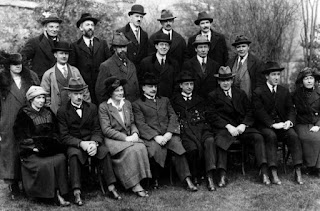Turning ideas into companies, tips on making it happen…
The startup scene in Dublin is vibrant yet many have poured their hearts and minds into their startups, with little to no success to date. Over 90% of startups fail, which by the numbers alone are turning out newly seasoned and committed entrepreneurs who are more learned, more agile and capable of achieving success with a start up then was probable before. With the climate in Dublin and elsewhere nurturing start ups with grants, tax breaks and mentorship, there is never been a better time to start up a new business. As the world slowly recovers from a horrendous recession, we see the buds of new business in cases such as India’s announcement of a $1.5 billion fund for startups just a few weeks ago.
From my own start up experience and observations, here are some points you may consider as central to increasing a startup's chances of success:
- Start like you mean to finish. Plot out what you want to become in success with a start up. Is it the next multi billion dollar company or a business to support you and your family with no wish to expand the business beyond a “mom and pop store”?
- If successful, will you sell your business? If so, when will this be? Plot a company size in revenue, employees and asset size (value of assets to turnover of business) when you will start considering offers to be bought out.
- Embrace modern Risk Management. Risk mapping, risk registers, risk assessments, 3rd party country risk, financial risk reports are all useful and are a good way to see your mapped future unfold as you build your business. If done from the start, you build into your structure a culture of risk management and thus information awareness.
- Scaling Systems. If you want to be the next billion dollar enterprise, you need to think about how IT infrastructure, systems design and development will fit into this vision. Will it be costly or seamless to scale your IT resources to fit business needs? Bootstrapped startups have great opportunities to develop low cost scalable systems using cloud and hosting providers. How it’s designed and built however will determine its true worth in availability, stability and scalability.
- Your digital brand. Market yourself for credibility, expertise and leadership as a Founder. Build your social media profile and creds with consistent high quality posts, blog articles and actions online that reinforce your digital brand message. If you approach a VC for funding, they will investigate you thoroughly including social media because in a startup, it’s the people, not the products that make the bew business successful.
- Network Network Network. You need to find co-founders, business partners and indeed potential customers in the marketplace. Meetup.com is a great start in your networking efforts that you should approach strategically.
- Community. Make sure you build bridges with your marketplace but also with the startup community. The access to people and shared experience is incredibly useful especially to a newly minted entrepreneur.
- Marketing. Build your marketing efforts based on tested Marketing models such as the 4P (Product, Price, Place, Promotion) and seek inputs on how you can develop a marketing strategy and a marketing mix that fits your startup
- Finance. If you are not funded, be sure to bootstrap everything you do, make sure your efforts are within a projected finance curve (ie. within budget) to where your business will start earning money for itself or you can reasonably expect to get VC capital on board so you can develop your business into a self sustaining entity.
- Create Value, then create Customers. Make sure your market research and everything you see from that point on is consistent with your products and services creating value for the customer. Qualitative approaches to service quality influence pricing and also create repeat customers. If you cannot create value in your customer's eyes, you will not have any customers.
- Stay Flexible. Start ups often start with a great plan and product. When the marketplace interacts with the start up, it often turns into something very different. Be sure your startup is structured flexibly so you “touch base” with your customers in a manner that creates value for them in what you do.
- Disrupting a market? If your product revolutionises a market place by its disrupter effect, then be ready to capitalise upon it. Have base plans for this type of dynamism in place so you don’t waste time wondering about what approach to take to capitalise upon it. Large companies act fast in protecting their market share from disrupters, so be sure to have a plan.
The need for flexibility, dynamism and intelligence is never more relevant than it is today even with a support structure in place. As the information era moves onwards, more and more opportunities will appear for aspiring Entrepreneurs. Taking that opportunity and turning it into something meaningful is often a hard learnt lesson through business failure. Once the budding Entrepreneur does not give up, their time will come and the days, months and years of trying will be rewarded by success.
Sources/Credits
Pics;









